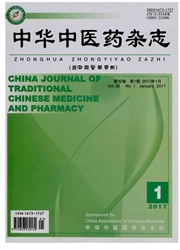

 中文摘要:
中文摘要:
目的:研究漆姑草(HSJ)提取物对人白血病细胞株K562细胞增殖和凋亡的影响,探讨其诱导凋亡的作用机制。方法:采用不同浓度的HSJ作用K562细胞后,四甲基偶氮唑蓝(MTT)比色法检测细胞增殖抑制率;TdT酶介导的末端缺失原位标记(TUNEL)法检测细胞凋亡率;免疫细胞化学法检测Bcl—2和Bax蛋白的表达;比色法检测Caspase-3和Caspase-9的活性。结果:HSJ对K562细胞的增殖抑制率随药物剂量增大而增加;HSJ作用后细胞凋亡率增加;Bcl-2蛋白阳性表达率下降,平均透光度增加;Bax蛋白阳性表达率增加,平均透光度下降;Caspase-3和Caspase-9的活性增强,与阴性对照组比较差异具有统计学意义(P〈0.05)。结论:HSJ能够诱导K562细胞凋亡;其诱导凋亡作用可能与下调Bcl-2蛋白表达水平,上调Bax蛋白表达水平,增强Caspase.3和Caspase-9的活性有关。
 英文摘要:
英文摘要:
Objective: To investigate the induced apoptotic effects and mechanism of Herba Saginae Japonicae (HSJ) on K562 cells. Methods: K562 cells were incubated with different concentrations of HSI. The K562 cellular proliferation inhibition rate was measured by methyl thiazolyl tetrazolium (MTT) method. Rate of apoptosis was detected by terminal deoxynucleotidyl transferase-mediated dUTP nick end labeling (TUNEL). The expressions of Bcl-2 and Bax proteins were determined by immunocytochemistry method. The activity of Caspase-3 and Caspase-9 was assayed by colorimetry with a commercial kit. Results: The K562 cellular proliferation inhibition rate increased with the increment of concentrations of HSJ. Compared with control group, after incubated with HSJ, the apoptotic ratios were increased; the positive rate of Bcl-2 protein expression decreased, and the average transmittance increased; the positive rate of Bax protein expression increased, and the average transmittance decreased. The activities of Caspase-3 and Caspase-9 increased, as well the differences were statistically significant (P〈0.05). Conclusion: HSJ could induce apoptosis of K562 cells, which might be associated with lowering protein expression level of Bcl-2 and increasing protein expression level of Bax, enhancing Caspase-3 and Caspase-9 activity.
 同期刊论文项目
同期刊论文项目
 同项目期刊论文
同项目期刊论文
 期刊信息
期刊信息
